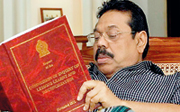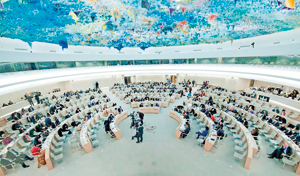Reply To:
Name - Reply Comment
Last Updated : 2024-04-25 11:43:00
_City-DM-9-2(1).jpg) not harm Sri Lanka’s national interests and sovereignty. According to other media reports, “there is no call for an international investigation.” A closer examination of the latest draft text will show, however, that such claims are incorrect and misleading.
not harm Sri Lanka’s national interests and sovereignty. According to other media reports, “there is no call for an international investigation.” A closer examination of the latest draft text will show, however, that such claims are incorrect and misleading. internal process. The mechanism envisaged is, in fact, the international investigation mechanism initially foreseen in the Darusman Report and reproduced in the Navi Pillay Report, albeit in its embryonic form.
internal process. The mechanism envisaged is, in fact, the international investigation mechanism initially foreseen in the Darusman Report and reproduced in the Navi Pillay Report, albeit in its embryonic form. Although, a number of media reports dismiss the present US draft arguing that it is simply a repetition of the request in the March 2012 US-sponsored resolution, the monitoring role given to an external entity to report to the Council on Sri Lanka’s actions is dangerously new. Unlike the March 2012 resolution, the present draft does not count on information provided by the Government on the steps taken domestically. That task is now given to an external mechanism. The Council will now rely on OHCHR to provide the information.
Although, a number of media reports dismiss the present US draft arguing that it is simply a repetition of the request in the March 2012 US-sponsored resolution, the monitoring role given to an external entity to report to the Council on Sri Lanka’s actions is dangerously new. Unlike the March 2012 resolution, the present draft does not count on information provided by the Government on the steps taken domestically. That task is now given to an external mechanism. The Council will now rely on OHCHR to provide the information. international mechanism” (Recommendation 1 (B)). It recommends that the mechanism “(monitor and assess the extent to which the Government of Sri Lanka is carrying out an effective domestic accountability process, including genuine investigations of the alleged
violations …” Other functions include conduct of independent investigations and “collection and safeguard for appropriate future use” of information provided to it, including that gathered by the Panel and the UN System.
international mechanism” (Recommendation 1 (B)). It recommends that the mechanism “(monitor and assess the extent to which the Government of Sri Lanka is carrying out an effective domestic accountability process, including genuine investigations of the alleged
violations …” Other functions include conduct of independent investigations and “collection and safeguard for appropriate future use” of information provided to it, including that gathered by the Panel and the UN System._City-DM-9-3.jpg) A few days from its very likely adoption, it is appropriate to take stock of where we are on the road to the infamous R2P and an international war crimes investigation.
A few days from its very likely adoption, it is appropriate to take stock of where we are on the road to the infamous R2P and an international war crimes investigation._City-DM-9-3(1).jpg) failed to place Sri Lanka on the agenda. In June 2010, the UN Secretary-General established the Darusman Panel, composed of individuals close to Washington and Brussels, “to advise him on the implementation of the joint commitment,” setting the stage for an international war crimes investigation.
failed to place Sri Lanka on the agenda. In June 2010, the UN Secretary-General established the Darusman Panel, composed of individuals close to Washington and Brussels, “to advise him on the implementation of the joint commitment,” setting the stage for an international war crimes investigation._City-DM-9-4.jpg) Recommendation 1 (A) of the Darusman Panel was set in motion by the March 2012 resolution, which gave a clear indication of the next steps and tied Sri Lanka to a 1-year timeline in which to initiate “credible and independent” actions on accountability and reconciliation. By pointing to gaps in the LLRC, it signalled that its future focus would be on accountability. It also permitted the High Commissioner to give official status to the Darusman Report, and submit to the Council at its current session a political report, rather than the requested technical report, a fait accompli.
Recommendation 1 (A) of the Darusman Panel was set in motion by the March 2012 resolution, which gave a clear indication of the next steps and tied Sri Lanka to a 1-year timeline in which to initiate “credible and independent” actions on accountability and reconciliation. By pointing to gaps in the LLRC, it signalled that its future focus would be on accountability. It also permitted the High Commissioner to give official status to the Darusman Report, and submit to the Council at its current session a political report, rather than the requested technical report, a fait accompli._City-DM-9-5.jpg)
_City-DM-9-6.jpg) One of the first steps that the High Commissioner is likely to take is to establish a team to undertake the monitoring operation, including through reinforcement of the human rights advisor currently attached to the UN Office in Colombo. Let us recall that establishing a field office for monitoring purposes was the aim of our detractors ever since 2006, when the then High Commissioner Louise Arbour visited Sri Lanka! It is likely that the funds to pay towards staff and programmes would come from voluntary funds, which are generally tied, and whose origins are likely to be the main sponsors of the resolution. Whatever the name given to the human rights advisor’s entity in Colombo, once the resolution is adopted, it would function as a “field office” with a monitoring mission!
One of the first steps that the High Commissioner is likely to take is to establish a team to undertake the monitoring operation, including through reinforcement of the human rights advisor currently attached to the UN Office in Colombo. Let us recall that establishing a field office for monitoring purposes was the aim of our detractors ever since 2006, when the then High Commissioner Louise Arbour visited Sri Lanka! It is likely that the funds to pay towards staff and programmes would come from voluntary funds, which are generally tied, and whose origins are likely to be the main sponsors of the resolution. Whatever the name given to the human rights advisor’s entity in Colombo, once the resolution is adopted, it would function as a “field office” with a monitoring mission!Ashoka Perera Friday, 22 March 2013 11:50 AM
This is a well researched writing Tamara. But who are you advising. A bunch of rogues who only know how to plunder resources of a nation that fought the worst terrorists and won a historical battle. They have gone mad and hell with the country. So let them pay the price at Hague and Sri Lankan will regain freedom similar to the battle ended at Nandikadal.

Add comment
Comments will be edited (grammar, spelling and slang) and authorized at the discretion of Daily Mirror online. The website also has the right not to publish selected comments.
Reply To:
Name - Reply Comment
US authorities are currently reviewing the manifest of every cargo aboard MV
On March 26, a couple arriving from Thailand was arrested with 88 live animal
According to villagers from Naula-Moragolla out of 105 families 80 can afford
Is the situation in Sri Lanka so grim that locals harbour hope that they coul